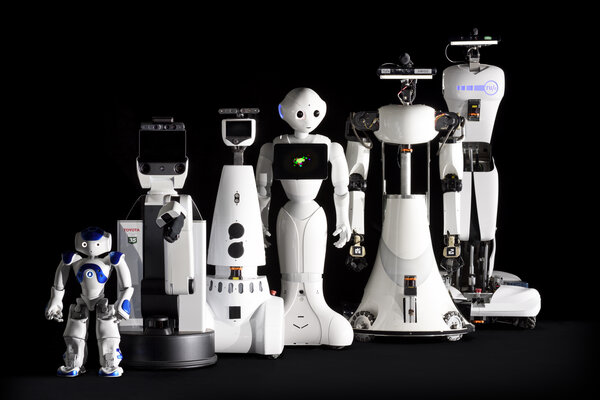Industrial robots more flexible thanks to soccer and care robots

Dealing with the unexpected (read: non-programmed events) is a routine task for TU Eindhoven’s soccer and care robots. After all, you never know what an opponent or user will do next. Industrial robots, too, can benefit from increased independence and autonomy. For this reason, the university has set up a pioneering research project together with industrial partners to provide mobile industrial robots with an open world view that adapts to changes in the environment. An important aspect of this is that the robots learn to understand what they see, allowing them to adapt better to new circumstances and situations.
The TU/e High Tech Systems Center, the companies Lely Industries, Vanderlande Industries, ExRobotics (ImProvia), Diversey and Rademaker combined with funding from the Topsector HTSM (TKI allowance) are co-investing EUR 1.5 million in the project, which goes under the name FAST (new Frontiers in Autonomous Systems Technology) and will run for four years starting in January 2018. TU/e has appointed four new PhD students to the project, who will be assisted by many Master’s students. The industrial partners cover a wide range of applications, including agriculture, internal logistics, inspection robots, high-tech bakery equipment and professional cleaning, and the door is open for partners from other fields to join.
FAST aims to develop mobile robots with increased flexibility that enables them to operate in changing environments. This has many advantages, for instance, the environment does not have to be fenced off, signaled or demarcated and specific zones or reference points will not be required. The usual assumption of a static world will be relaxed and adaptation of the robot to its environment increased, which is expected to lead to reduced development time.
In order to be more mobile and flexible, the robots need so-called ‘semantic world models’. ‘Semantic’ means that a robot can give meaning to observations, and recognize situations and objects, enabling it to react more appropriately to specific situations. Being able to distinguish between, for example, a pallet with goods, a group of people and a forklift truck means there are wide range of different situations the robot can respond to. In addition, robots also need to proactively gather information in order to assess a situation more precisely, so that ultimately they are able to carry out their task better. This can be done by, for example, using multiple sensors to actively observe and monitor situations, by retrieving data from the Internet of Things, or by consulting a human.
This new information is added to the robot’s world view. This means that the robot actually learns from previously solved tasks so that the next time a situation occurs, it will be able to deal with or prevent a situation more easily. Robots will become more and more integrated into people’s lives and people will increasingly interact and engage with robots. Therefore, interaction with people is a key component within the semantic world model.
The project is a result of a TU/e High Tech Systems Center survey carried out among Dutch high-tech industries in order to identify robotics-related challenges or problems for which TU/e’s expertise is required. The most important thing that the survey revealed was the desire to make mobile robotic systems more autonomous, a field in which TU/e is a frontrunner. Every year for more than a decade, the TU/e soccer robot and care robot teams have picked up prizes in RoboCup, the leading and largest competition for intelligent robots and one of the world’s most important technology events..
The collaboration between the university and its industrial partners, and between partners themselves, allows for experiences to be shared quickly and use cases to be contributed early on in the development process. It is expected that this will considerably shorten development turnaround time and thereby consolidate the Netherlands’ position as top player in the field of mobile robotics. The project also provides a platform for students to gain relevant industry experience, something which, given the growing shortage of engineering talent, will also boost the Netherlands’ competitive position in this area.
The TU/e departments participating in the project are Electrical Engineering, Mechanical Engineering and Industrial Engineering & Innovation Sciences.